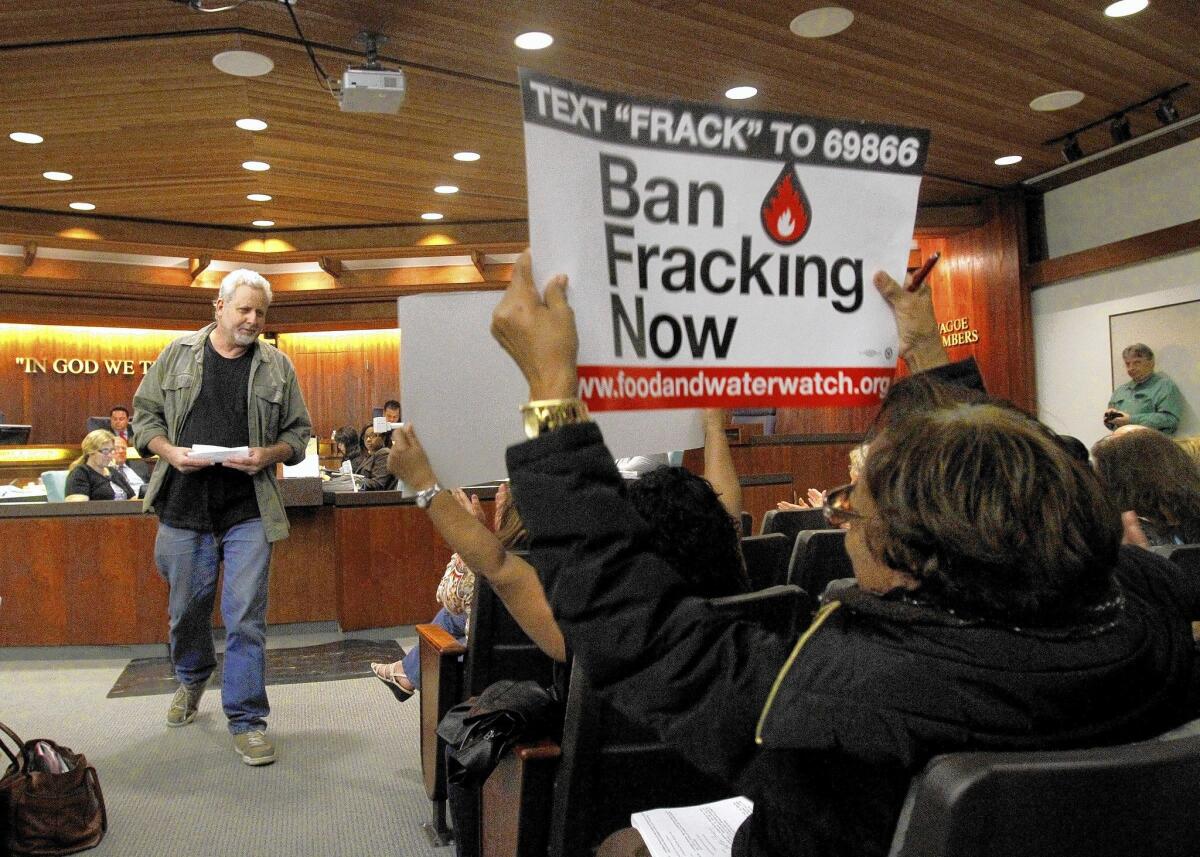City of Carson changes mind on new oil drilling ban

- Share via
Just weeks after the city of Carson grabbed headlines by placing a moratorium on all new oil drilling, City Council members will allow the temporary ban to die, reopening the door to a massive drilling project in the city.
The moratorium, which will expire Friday, was initially sought by council leaders to allow the city more time to study the potential effects of oil extraction techniques such as hydraulic fracturing, or fracking, and acidization.
A related action called for the city to halt all negotiations with Occidental Petroleum Corp., which is seeking to drill more than 200 wells in northern Carson near the Cal State Dominguez Hills campus and a number of homes.
The move captured the attention of environmentalists and labor unions statewide, and even that of Gov. Jerry Brown, who called the city’s mayor to discuss the moratorium at length before the vote to let the moratorium expire.
During a meeting this week, supporters of the drilling project — many of them union members with T-shirts and signs that read “Jobs for Carson” and “Oppose the Ban” — turned out in force, arguing that jobs were on the line.
“My daughter went to Carson High … and I want her to have the opportunity to have a job,” said David McHugh, who works as a safety officer on drilling rigs. “I’ve raised kids, I bought a house … and I did it with the money that I earned in the oil business.”
A 2011 report from the Los Angeles County Economic Development Corp. estimated that the Occidental drilling project could bring in as much as $8 million in state and local tax revenues and produce over the life of the project more than 330 jobs. A spokesman for the company said at least half of those jobs would be based in the Los Angeles region. A Carson economic development manager said that in addition, the city could negotiate a fee that could bring millions more dollars during the life of the project.
Controversy initially began over whether Occidental would employ fracking or other controversial well-stimulation techniques.
After initially saying it might, the company has repeatedly vowed not to use such technologies.
But the debate in Carson evolved into a larger discussion about all oil drilling within city limits.
Councilman Al Robles, who first sought the moratorium in February, told the audience that push back had become so fierce that he was confronted by a group of labor organizers in a locked room as they urged him to repeal the moratorium.
“Fracking has become a proxy for a much larger discussion and debate,” Tupper Hull, a spokesman for the Western States Petroleum Assn., told The Times after the vote last month.
A state law that took effect in January requires oil companies to obtain permits for fracking while state agencies develop more comprehensive regulations. But those regulations are not expected to be finalized until next year.
Increasingly, cities are turning to local ordinances to fight back. The Los Angeles City Council voted in February to draft regulations that would ban fracking, acid stimulation and “gravel-packing.”
On the heels of Carson’s moratorium, the cities of Beverly Hills and Compton also have taken steps to limit or ban fracking.
In a statement, Bill McFarland, an Occidental representative, applauded Carson for letting the moratorium die, saying it demonstrates “that the city continues to recognize the value of an industry that brings safe projects and good jobs to the community.”
Carson Mayor Jim Dear and Councilman Elito Santarina voted against extending the moratorium, saying they believed it would be in the city’s best interest to negotiate with Occidental officials over specific provisions in an enforceable contract. Councilman Mike Gipson, who expressed similar sentiments, abstained.
Dear said certain measures such as a local hiring requirement or a $50-million bond issue for any potential cleanup could be among the protections the city fights for in the talks.
But City Atty. Bill Wynder cautioned that with the expiration of the moratorium, the city can no longer take up the issue of oil drilling in a future temporary ban.
“If you’re an individual committed to no new oil drilling in Carson’s future, that is no longer on the table,” Wynder said.
More to Read
Sign up for Essential California
The most important California stories and recommendations in your inbox every morning.
You may occasionally receive promotional content from the Los Angeles Times.













